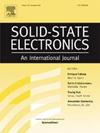Analysis of breakdown voltage for GaN MIS-HEMT with various composite field plate configurations and passivation layers
Abstract
The effects of different field plate designs on the breakdown voltage of GaN Metal-insulator-semiconductor high electron mobility transistors (MIS-HEMTs) were examined in this study. The study's primary goal was to determine the dependence of breakdown voltage with respective to composite field plate designs using TCAD simulation. For devices featuring only G-FP, with a fixed gate to drain distance of 15 μm and a fixed G-FP to drain distance of 15 μm, the maximum breakdown voltage was achieved 1 μm G-FP. Breakdown voltage trends were also determined for composite field plate configurations, such as adding a source field plate (S-FP) or a drain field plate (D-FP) with a fixed 1 μm G-FP length. A further enhancement in device breakdown performance was demonstrated by employing a novel D-FP structure. A single D-FP improves the breakdown voltage from 1.4 kV (conventional breakdown voltage with 1um G-FP) to 1.6 kV when combined with 1 μm G-FP, while the novel two-step D-FP achieves a breakdown voltage of about 1.7 kV when combined with 1 μm G-FP. We also investigated the influence of high-k dielectric passivation layers on the breakdown voltage. The breakdown voltage of the devices with optimized G-FP can be further improved by using high-k dielectric material as a passivation layer. The thorough investigations contribute to a better understanding of GaN MIS-HEMT breakdown characteristics and prospective pathways for improving their performance via unique field plate designs and superior dielectric materials.

 求助内容:
求助内容: 应助结果提醒方式:
应助结果提醒方式:


